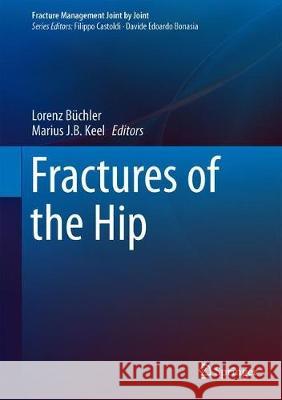Fractures of the Hip » książka



Fractures of the Hip
ISBN-13: 9783030188375 / Angielski / Twarda / 2019 / 196 str.
Fractures of the Hip
ISBN-13: 9783030188375 / Angielski / Twarda / 2019 / 196 str.
(netto: 383,36 VAT: 5%)
Najniższa cena z 30 dni: 385,52
ok. 22 dni roboczych.
Darmowa dostawa!
1 Anatomy of the Hip Joint.- 2 Radiology of the Hip Joint.- 3 Surgical Management.- 4 Anterior approaches to the Acetabulum: Ilio-Inguinal approach, Smith-Petersen approach and anterior intrapelvic approach (modified Stoppa).- 5 Pararectus Approach. -6 Lateral approach the pelvis and hip: Kocher-Langenbeck approach and bigastric trochanteric flip and surgical hip dislocation.- 7 Extended approaches.- 8 Combined Approaches.- 9 Traumatic hip dislocations.- 10 Acetabular Fractures.- 11 Pipkin Fractures.- 12 Femoral neck fracture.- 13 Pathological Fractures.- 14 Malunion and nonunion.- 15 Arthroscopic treatment of hip fracture sequelae.
Dr. Büchler graduated from the medical faculty of the University of Bern, Switzerland, in 1998. After completing his thesis on confocal imaging of calcium propagation in heart cells at the Department of Physiology of the University of Bern (Prof. André Kléber), he began his clinical training in general and trauma surgery at the regional hospital of Burgdorf and later completed the orthopaedic residency at the Department of Orthopaedic and Trauma Surgery of the University Hospital of Bern (Prof. Reinhold Ganz). After obtaining the Swiss Orthopaedic Specialist Degree, he completed a one year fellowship at the Department of Orthopaedic and Trauma Surgery of the University Hospital of Gothenburg, Sweden (Prof. Carl Ekholm). In 2007 he returned to the University of Bern as staff surgeon and deputy team leader of the Hip Team under Professor Klaus Siebenrock, specializing in revision hip arthroplasty, hip-preserving surgery and traumatology. During this time he undertook several additional fellowships, including hip-arthroscopy with Dr. Marc Philippon in Vail/USA, and was awarded the 2009 EFORT Travelling Fellowship in Norway and the 2010 ASG/AOA Travelling Fellowship in the US and Canada. In 2013, he was appointed head of the Orthopaedic Department and Musculoskeletal Unit of the Hospital of Biel, Switzerland. Dr. Büchler is a highly specialized hip surgeon and regular presenter at national and international conferences, and conducts hip-related research in close cooperation with the Hip Team of the University Hospital of Bern.
Professor Keel obtained his medical degree from the University of Zürich, Switzerland after studying in Fribourg and Zürich. After two years of research at the Division of Trauma Surgery at the University Hospital of Zürich (Prof. Otmar Trentz) and completing the Postgraduate Course in Experimental Medicine and Biology of the Medical Faculty of the University of Zürich, he fulfilled his general and trauma surgery residency at the Division of Trauma Surgery of the University of Zürich and at two regional hospitals in Männedorf and Bülach. After his return to Zürich he became trauma team leader at the Division of Trauma Surgery and later deputy clinic director. In 2004 Professor Keel completed two fellowships: in hip and pelvic surgery (Dr. Joel Matta) and in general trauma surgery (Prof. Demetrios Demetriades) in Los Angeles. In 2008 he changed to the University Hospital of Bern at the Department of Orthopaedic and Trauma Surgery (Prof. Klaus Siebenrock), where he specialized in hip, pelvic and spinal surgery. During this time he developed the “Pararectus approach”. He later became team leader for trauma, spine and pelvic surgery, and from 2012 to 2017 served as deputy clinic director. Furthermore he took part in the launch of the Clinic for Orthopaedic and Trauma Surgery at the Tiefenau Hospital in Bern. Since 2017 he works as consultant at the Trauma Center of the Hirslanden Hospital in Zürich and remains senior consultant for complex pelvic and spinal surgeries at the University Hospital in Bern. Professor Keel conducts pelvis-related research in Bern and is a regular faculty member of important pelvic courses worldwide. In the period 2017/2018 he served as President of the European Society for Trauma and Emergency Surgery (ESTES).
This book is intended as a state-of-the-art reference guide that will help surgeons arrive at the correct diagnosis, make appropriate treatment decisions, and perform various surgical procedures in patients with intra-articular hip fractures.
The volume describes the complex anatomy of the acetabulum and proximal femur and correlates it with appearances in radiological imaging. In addition, it explains the process of assessing and classifying typical fracture patterns, presenting and discussing specific, up-to-date treatment strategies.
The book clearly highlights the advantages and disadvantages of several surgical approaches for the hip and pelvis, such as surgical hip dislocation, hip arthroscopy, the pararectus approach, and combined approaches. Individual chapters are also devoted to the management of specific fracture types: acetabular fractures, femoral head (Pipkin) fractures, femoral neck fractures, traumatic hip dislocations, and pathological fractures due to osteoporosis or tumors. For each surgical approach, the authors identify typical complications and document long-term outcomes. This book is part of the series Fracture Management Joint by Joint.
1997-2026 DolnySlask.com Agencja Internetowa
KrainaKsiazek.PL - Księgarnia Internetowa









